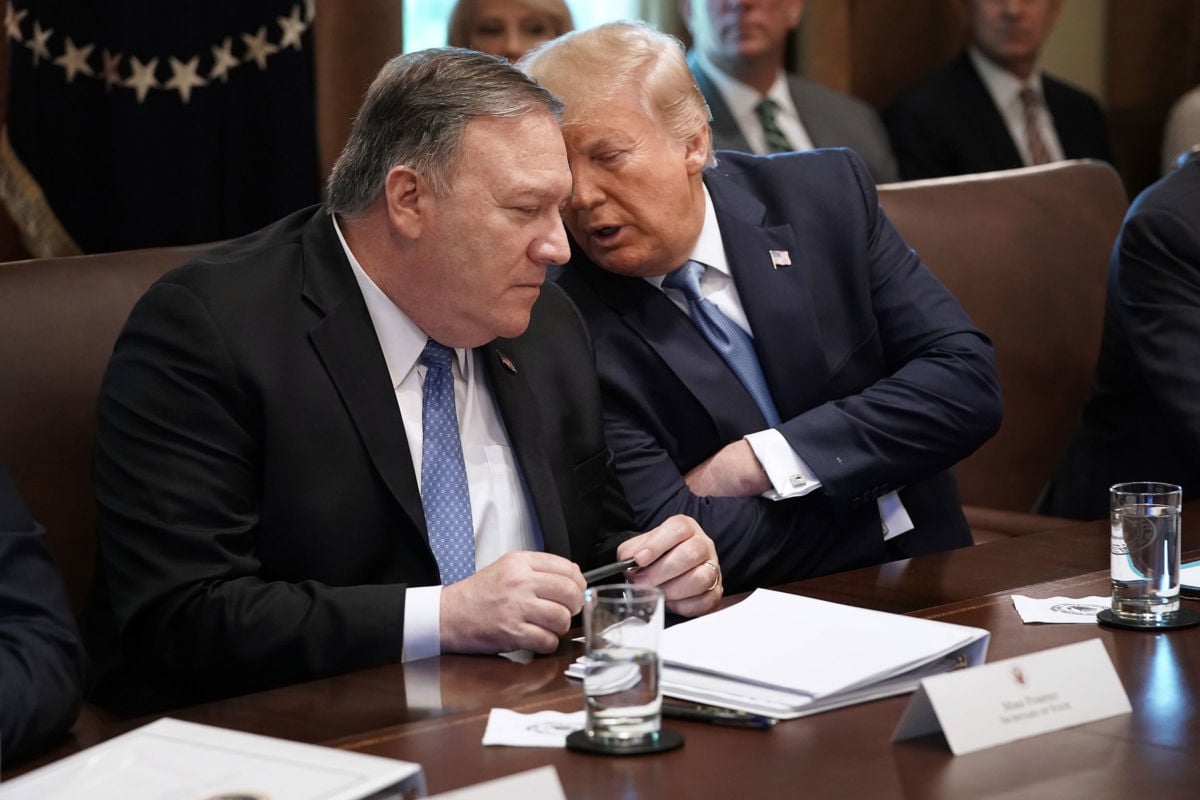by DAVID BARSAMIAN

President Trump talks with Secretary of State Mike Pompeo during a cabinet meeting at the White House on July 16, 2019, in Washington, D.C. PHOTO/Chip Somodevilla/Getty Images
“Any concern about Iranian weapons of mass destruction could be alleviated by the single means of heeding Iran’s call to establish a weapons-of-mass-destruction-free zone in the Middle East,” says legendary public intellectual Noam Chomsky, but that isn’t stopping the Trump administration from concocting stories about Iran threatening to “conquer the world” in order to escalate tensions and thereby strengthen Trump’s hand going into the 2020 election.
In this exclusive transcript of a conversation aired on Alternative Radio, Noam Chomsky — the brilliant MIT professor and linguist who in one index is ranked as the eighth most cited person in history, right up there with Shakespeare and Marx — discusses Iran’s military deterrence strategy and the actions taken by U.S. leaders who cannot countenance what the State Department describes as Iran’s “successful defiance.”
David Barsamian: Let’s talk about Iran, in particular, locating it in post-1945 U.S. foreign policy. Washington laid out its Grand Area Strategy and Iran takes on enormous significance because of its oil wealth.
Noam Chomsky: Oil wealth and strategic position. It was taken for granted in the Grand Area Strategy planning that the U.S. would dominate the Middle East, what Eisenhower called the “strategically most important part of the world,” a material prize without any analogue.
The basic idea of the early stage of the Grand Strategy and the early stages of the war were that the U.S. would take over what they called the Grand Area, of course, the Western Hemisphere, the former British Empire and the Far East. They assumed at that time that Germany would probably win the war, so there would be two major powers, one German-based with a lot of Eurasia and the U.S. with this Grand Area. By the time it was clear that the Russians would defeat Germany, after Stalingrad and then the great tank battle in Kursk, the planning was modified, and the idea was that the Grand Area would include as much of Eurasia as possible, of course, maintaining control of Middle East oil resources.
There was a conflict over Iran right at the end of the Second World War. The Russians supported a separatist movement in the north. The British wanted to maintain control. The Russians were essentially expelled. Iran was a client state under British control. There was, however, a nationalist movement, and the Iranian leader, Mohammad Mossadegh, led a movement to try to nationalize Iranian oil.
The British, obviously, didn’t want that. They tried to stop this development, but they were in their post-war straits and were unable to do it. They called in the U.S., which basically took the prime role in implementing a military coup which deposed the parliamentary regime and installed the Shah, who was a loyal client. Iran remained one of the pillars of control of the Middle East as long as the Shah remained in power. The Shah had very close relations with Israel, the second pillar of control. They were not formal because theoretically, the Islamic states were supposed to be opposed to Israeli occupation, but the relations were extremely close. They were revealed in detail after the Shah fell. The third pillar of U.S. control was Saudi Arabia, so there was kind of a tacit alliance between Iran and Israel and, even more tacit, Israel and Saudi Arabia, under U.S. aegis.
Truthout for more
